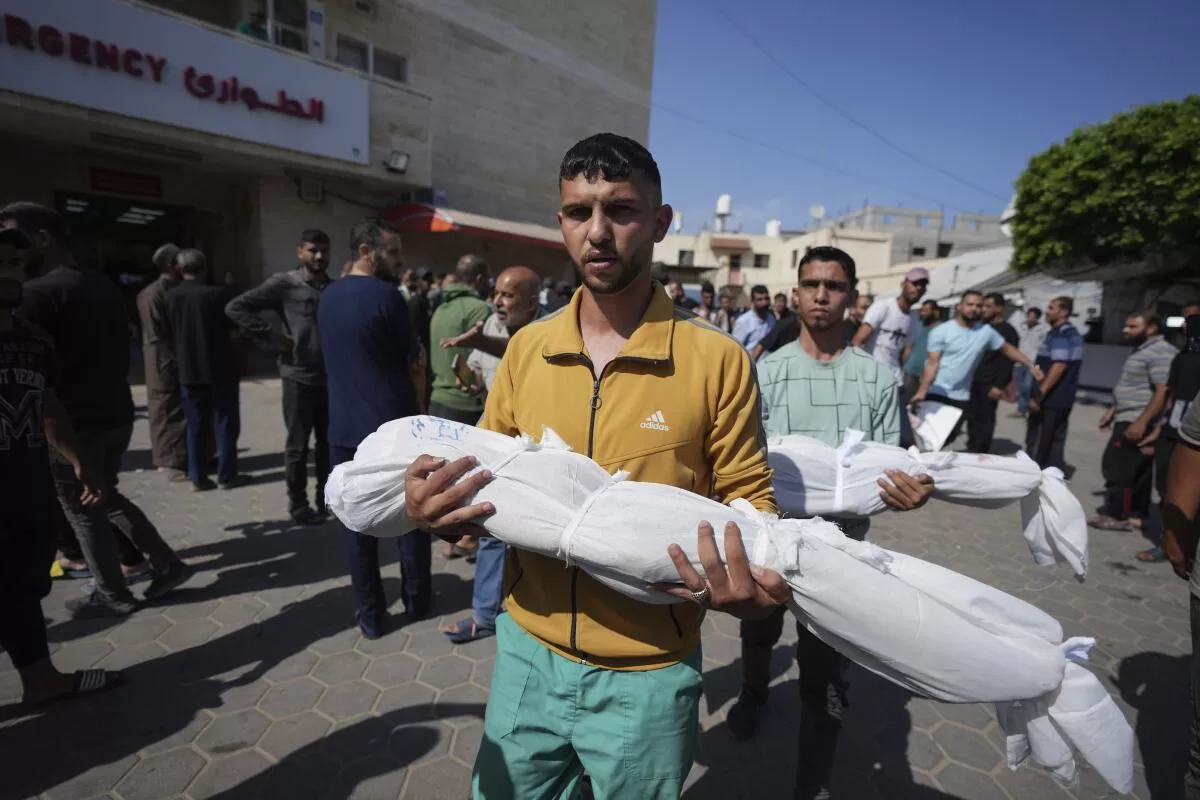Biden outlined a three-phase deal Friday that he said was proposed by Israel to Hamas, saying the militant group is “no longer capable” of carrying out a large-scale attack on Israel like the one in October that started the fighting. He urged Israel and Hamas to reach an agreement to release about 100 remaining hostages, along with the bodies of around 30 more, for an extended cease-fire in Gaza.
Cease-fire talks halted last month after a push by the U.S. and other mediators to secure a deal in hopes of averting a full-scale Israeli invasion of Gaza’s southern city of Rafah. Israel says the Rafah operation is key to uprooting Hamas fighters responsible for the deadly Oct. 7 attack in southern Israel.
Israel on Friday confirmed its troops were operating in central parts of the city. The ground assault has led around 1 million Palestinians to leave Rafah and has thrown humanitarian operations into turmoil.
(Abdel Kareem Hana / Associated Press)
Following Biden’s speech, hostage families said time was running out.
“This might be the last chance to save lives,” Gili Roman told the Associated Press. His sister, Yarden Roman-Gat, was taken hostage and freed during a weeklong cease-fire in November, but Yarden’s sister-in-law, Carmel, is still held.
“There is no other way towards a better situation for all. Our leadership must not disappoint us,” Roman said. “But mostly, all eyes should be on Hamas.”
The proposal came after what hostage families called an aggressive meeting Thursday with Israel’s national security advisor, Tzachi Hanegbi, who told them that the government wasn’t ready to sign a deal to bring all hostages home and that there was no plan B.
Hanegbi said this week he expects the war to continue another seven months to destroy the military and governing capabilities of Hamas and the smaller Islamic Jihad militant group.
Israeli Prime Minister Benjamin Netanyahu has promised a “total victory” that would remove Hamas from power, dismantle its military structure and return the hostages.
On Saturday, the government said that its conditions for ending the war hadn’t changed and that putting a permanent cease-fire in place before the conditions are fulfilled is a “nonstarter.”
Many families of hostages accuse the government of a lack of will to secure a deal.
“We know that the government of Israel has done an awful lot to delay reaching a deal, and that has cost the lives of many people who survived in captivity for weeks and weeks and months and months,” Sharone Lifschitz said. Her mother, Yocheved, was freed in the November cease-fire, and her father, Oded, is still being held.
The first phase of the deal announced by Biden would last for six weeks and include a “full and complete cease-fire,” a withdrawal of Israeli forces from all densely populated areas of Gaza and the release of a number of hostages, including women, older people and the wounded, in exchange for the release of hundreds of Palestinian prisoners.
The second phase would include the release of all remaining living hostages, including male soldiers, and Israeli forces would withdraw from Gaza. The third phase calls for the start of a major reconstruction of Gaza, which faces decades of rebuilding from the war’s devastation.
Biden acknowledged that keeping the proposal on track would be difficult, with a number of “details to negotiate” to move from the first phase to the second. Biden said that if Hamas fails to fulfil its commitment under the deal, Israel can resume military operations.
Hamas said in a statement Friday that it viewed the proposal “positively” and called on Israel to declare explicit commitment to an agreement that includes a permanent cease-fire, a complete withdrawal of Israeli troops from Gaza, a prisoner exchange and other conditions.
In Deir al Balah, where many Palestinians have fled following Israel’s ground assault on Rafah, there was some hope.
“This proposal came late, but better late than never,” said Akram Abu al Hasan. “Therefore, we hope from God, the American administration, and the European community in general to continue to put pressure on Israel for a cease-fire.”
The main difference from previous proposals is the readiness to stop the war for an undefined period, according to analysts. It leaves Israel the option to renew the war and diminish Hamas’ ability to govern, but over time, said Michael Milshtein, head of the Palestinian Studies Forum in Dayan Center at Tel Aviv University.
Experts said that Biden’s speech was one of the few times that gave hope the war might end.
“It was a very good speech … it seems that Biden is trying to force it on the Israeli government, he was clearly speaking directly to the Israeli people,” said Gershon Baskin, director for the Middle East at the International Communities Organization.
Also on Saturday, Egypt’s state-run Al-Qahera News said that officials from Egypt, the United States and Israel would meet in Cairo over the weekend for talks about the Rafah crossing, which has been closed since Israel took over the Palestinian side in early May.
The crossing is one of the main ways for aid to enter Gaza. Egypt has refused to open its side, fearing the Israeli hold will remain permanent. Egypt has demanded that Palestinians be put back in charge of the facility. The White House has been pressing Egypt to resume the flow of trucks.
Hamas’ attack on Oct. 7 killed around 1,200 people — mostly civilians — and abducted about 250. More than 36,370 Palestinians have been killed in Gaza by Israel’s campaign of bombardment and ground assaults, according to Gaza’s Health Ministry. Its count doesn’t differentiate between civilians and combatants.
Associated Press writer Mednick reported from Tel Aviv. Shurafa reported from Deir al Balah, Gaza Strip. David McHugh in Frankfurt, Germany, and Samy Magdy in Cairo, Egypt, contributed to this report.
